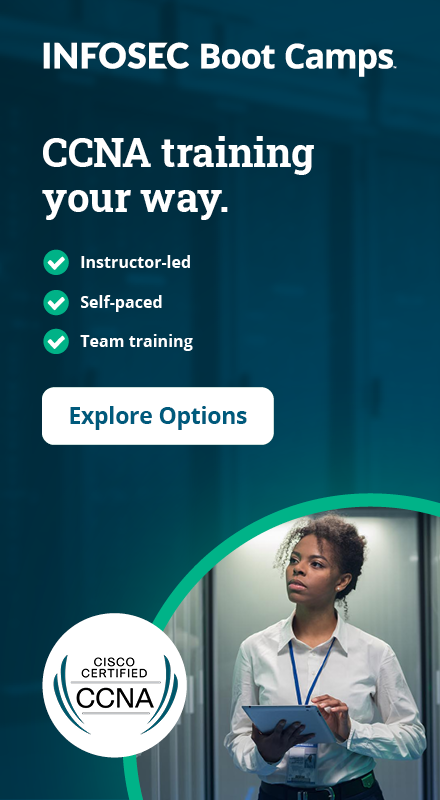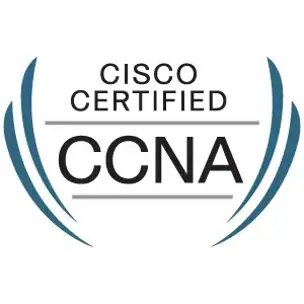CCNA certification overview and career path
Cisco certifications remain among the most valuable credentials in IT, with Cisco leading the infrastructure market share worldwide. For professionals looking to build or advance their networking careers, understanding what is CCNA certification and the broader Cisco certification path is essential for making informed career decisions in 2025.
This CCNA certification overview will help you explore the value and CCNA certification benefits, and understand how these Cisco networking credentials can accelerate your career advancement. Whether you're starting your journey or looking to advance your network engineering expertise, this guide covers everything you need to know.

Earn your CCNA, guaranteed!
Most popular Cisco certifications
Cisco's certification program spans multiple networking and security specializations, offering clear progression paths for professionals at every level. The following certifications are three of the most sought-after:
Cisco Certified Network Associate (CCNA): This foundational network engineering certification establishes core competencies in routing and switching expertise while introducing essential network security concepts. The CCNA serves as the cornerstone for advanced certifications and validates your ability to configure and troubleshoot medium-sized enterprise networks. Explore current CCNA job opportunities across various sectors.
Cisco Certified Cybersecurity Associate: This IT networking qualification provides hands-on skills for threat identification and incident response using Cisco security tools. Its popularity reflects growing demand for professionals who can navigate complex security environments. (Note: This certification was previously known as Cisco Certified CyberOps Associate.)
Cisco Certified Network Professional (CCNP): This intermediate-level network infrastructure certification targets experienced professionals seeking to validate expertise in designing and implementing complex Cisco-based enterprise networks. The CCNP bridges foundational knowledge with real-world enterprise network management.
What is CCNA certification? Benefits and value proposition
The CCNA (Cisco Certified Network Associate) stands as one of the most recognized Cisco networking credentials globally. This network engineering pathway offers substantial CCNA certification benefits that extend far beyond basic networking knowledge.
Why get CCNA certified
The CCNA certification value lies in its comprehensive approach to networking fundamentals combined with practical security applications. Here's why professionals choose this path:
- Industry recognition: Employers worldwide recognize CCNA as proof of a solid networking foundation and commitment to professional development. The certification validates your routing and switching expertise across various network environments.
- Career advancement: CCNA career advancement opportunities span multiple industries and roles. Certified professionals often move into network administrator, network engineer and security specialist positions.
- Salary benefits: CCNA-certified professionals command competitive salaries. According to recent data, professionals with CCNA certification earn significantly more than their non-certified counterparts. Learn more about specific CCNA salary benefits in today's market.
- Job market demand: The growing complexity of network infrastructure creates consistent job outlook for CCNA professionals.
Is CCNA worth it in 2025?
Absolutely. The CCNA remains highly relevant as organizations increasingly rely on secure, well-designed networks. The certification covers modern networking concepts, including automation, programmability and security integration — skills that align with current industry trends.
CCNA vs other certifications
When comparing networking credentials, CCNA offers unique advantages:
- Vendor-specific expertise: Deep knowledge of Cisco technologies used in most enterprise environments
- Balanced approach: Combines networking and security concepts in one certification
- Clear progression path: Natural stepping stone to advanced Cisco certifications
- Global recognition: Accepted worldwide as proof of networking competency
For detailed information about the exam structure and preparation, review the CCNA exam details. To get started, check out the CCNA certification requirements.

Earn your CCNA, guaranteed!
Cisco certification paths for cybersecurity professionals
Cisco offers specialized tracks that allow professionals to focus on specific areas while building comprehensive expertise.
Entry-to-professional cybersecurity track
- Cisco Certified Support Technician (CCST) Cybersecurity: This foundational certification validates understanding of basic security principles and vulnerability assessment. It prepares beginners for entry-level roles like security technician or specialized help desk support.
- Cisco Certified Cybersecurity Associate: This certification builds on foundational knowledge and positions you for security analyst or technician roles with hands-on threat response capabilities. (Note: Previously known as Cisco Certified CyberOps Associate.)
- Cisco Certified Cybersecurity Professional: This advanced credential focuses on security automation and orchestration, preparing professionals for security engineer roles where automation plays a central role. (Note: Previously known as Cisco Certified CyberOps Professional.)
Enterprise security specialization
Cisco Certified Network Professional (CCNP) Security: After achieving CCNA, this intermediate certification validates expertise in securing complex enterprise networks. It covers secure network design, vulnerability management and advanced Cisco security solutions, including ASA and NGFW technologies.
Expert-level certifications
Cisco Certified Internetwork Expert (CCIE) Security: As the pinnacle of Cisco security expertise, CCIE validates the ability to design, implement and optimize complex secure network solutions. This certification targets experienced professionals aiming for leadership roles like security architect or engineering manager.
Cisco certification levels explained
Cisco structures its certification framework across four distinct levels, providing clear progression paths for network engineering professionals.
Entry level
Cisco Certified Support Technician (CCST) validates foundational cybersecurity knowledge and incident response skills, making it ideal for those seeking entry-level support roles or preparing for associate-level certifications.
Associate level
Three associate certifications build essential skills for associate-level professionals:
- Cisco Certified Network Associate (CCNA): For professionals targeting enterprise networking roles, CCNA proves the ability to install, configure and troubleshoot medium-sized networks.
- Cisco Certified Cybersecurity Associate: Security-focused professionals use this certification to validate threat identification and mitigation skills across diverse networking environments.
- Cisco Certified DevNet Associate: Demonstrates ability to implement network applications on Cisco platforms and automate IT processes.
Professional level
Two professional certifications advance cybersecurity careers:
- Cisco Certified Network Professional (CCNP) Security: Transforms capable security technicians into network security architects through advanced threat defense and secure network design training.
- Cisco Certified Cybersecurity Professional: Builds on associate-level skills, focusing on security automation and proactive threat hunting capabilities.
Additional professional certifications include:
- CCNP Enterprise (complex enterprise network implementation)
- CCNP Service Provider (scalable service provider networks)
- CCNP Data Center (secure data center network design and automation)
- CCNP DevNet Professional (advanced network application development)
- CCNP Collaboration (Cisco collaboration solution design and management)
Expert level
Cisco Certified Internetwork Expert (CCIE) Security: The most advanced cybersecurity certification from Cisco is CCIE. This certification signifies mastery in designing and troubleshooting complex secure network solutions, validating the expertise needed for senior leadership roles.
Other expert certifications serve specialized paths:
- CCIE Enterprise Infrastructure
- CCIE Service Provider
- CCIE Enterprise Wireless
- CCIE Data Center
- CCIE Collaboration
- Cisco Certified Design Expert (CCDE)
- Cisco Certified DevNet Expert

Earn your CCNA, guaranteed!
Strategic benefits of Cisco cybersecurity certifications
Cisco certifications represent a strategic investment for security professionals seeking to excel in today's competitive technology landscape.
Global recognition and market demand
Cisco certifications signal dedication to continuous learning and proficiency with industry-leading security solutions. With nearly half of enterprises using Cisco infrastructure, certified professionals become highly desirable candidates. Research indicates that most employers view IT certifications as reliable predictors of employee success.
Enhanced earning potential
Studies consistently demonstrate that Cisco certifications correlate with increased salaries. Current salary ranges for certified professionals vary based on location, experience and industry, but the certification premium remains consistent across markets.
Technical expertise development
The certification preparation process develops a deep understanding of security principles, best practices and Cisco security solutions. This knowledge enables professionals to tackle complex security challenges confidently while becoming valuable organizational assets.
Preparing for Cisco cybersecurity certifications
Success in Cisco certification requires strategic preparation aligned with your learning style and schedule.
Training options
Boot camps: Infosec offers intensive, structured programs that condense significant material into focused timeframes. The Cisco CCNA & Cybersecurity Associate Boot Camp prepares students for two certifications in seven days, while the standalone CCNA Boot Camp delivers exam readiness in five days. Advanced professionals can pursue the CCNP Boot Camp for comprehensive preparation in 10 days.
On-demand learning: Flexible learners benefit from Infosec's self-paced options, including the Cisco Certified Network Associate (CCNA) Learning Path and Cisco Certified Cybersecurity Associate Learning Path. These comprehensive programs offer videos, practice exams and study materials accessible anytime.
Free resources: Supplement primary study materials with community forums, technical blogs and practice tests available online.
Preparation strategies
- Develop realistic study schedules with dedicated time for each exam objective
- Use practice exams to identify knowledge gaps and familiarize yourself with question formats
- Engage with online communities like TechExams to connect with fellow candidates
- Seek guidance from certified mentors or instructors when challenging concepts arise
Certification maintenance and renewal
Maintaining your Cisco certification requires ongoing professional development. Understanding CCNA renewal requirements ensures continuous credential validity and demonstrates commitment to staying current with evolving technologies.

Earn your CCNA, guaranteed!
Your path forward with Cisco certifications
This comprehensive overview has explored the diverse Cisco cybersecurity certification landscape, from entry-level credentials to expert designations. We've examined certification paths, skill validation, career opportunities and the significant benefits of pursuing these credentials.
Cisco certifications offer structured, industry-aligned approaches to learning cybersecurity that remain highly relevant in today's competitive job market. Whether you're beginning your cybersecurity journey or advancing toward leadership roles, Cisco certification paths provide clear progression opportunities.
The investment in Cisco certification extends beyond personal career advancement — it contributes to a more secure digital future for everyone. Take the first step today toward becoming a highly sought-after Cisco-certified cybersecurity professional.
Frequently asked questions
What are the prerequisites for starting Cisco cybersecurity certifications?
Most Cisco certifications have no formal prerequisites, although foundational networking knowledge provides benefits to learners. The Cisco Certified Support Technician (CCST) certification provides an ideal starting point for beginners.
How do Cisco certifications compare to other cybersecurity credentials in terms of value and recognition?
Cisco certifications enjoy global recognition among cybersecurity employers. They offer strong foundations in networking security principles and practical skills with Cisco solutions. While other certifications may focus on broader concepts or different vendors such as AWS or Azure, the best choice depends on career goals and desired specialization.
Can Cisco certifications help professionals transition into cybersecurity from other IT disciplines?
Cisco certifications provide clear transition paths for IT professionals from other disciplines. The entry-level Cybersecurity Associate certification offers practical skills for security threat identification and response, making it an excellent starting point for career changers.







